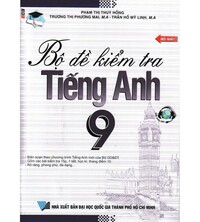Writing - trang 10 - Unit 7 - Sách bài tập (SBT) tiếng Anh 9 mới
Make sentences using the words and phrases below to help you. You can add extra words or make changes. Hoàn thành các câu sau sử dụng từ và cụm từ dưới đây. Có thể thêm từ để thay đổi.
Bài 1
Task 1. Make sentences using the words and phrases below to help you. You can add extra words or make changes.
Hoàn thành các câu sau sử dụng từ và cụm từ dưới đây. Có thể thêm từ để thay đổi.
Lời giải chi tiết:
1 Children/adolescent/should/eat/sufficient/nutritious/foods/grow/develop normally.
Đáp án: Children and adolescents should eat sufficient nutritious foods to grow and develop normally.
Tạm dịch: Trẻ em và thanh thiếu niên nên ăn đủ thực phẩm bổ dưỡng để tăng trưởng và phát triển bình thường.
2. Although/eat/breakfast/dinner/home/students/usually/have/lunch/school.
Đáp án: Although they eat breakfast and dinner at home, students usually have lunch at school.
Tạm dịch: Mặc dù ăn sáng và ăn tối ở nhà, học sinh thường ăn trưa ở trường.
3. Healthy lunches/important/for/them/because/these/help/concentrate/learning.
Đáp án: Healthy lunches are important for them because these help them concentrate on learning.
Tạm dịch: Bữa trưa lành mạnh rất quan trọng đối với chúng vì điều đó giúp chúng tập trung vào việc học.
4. Some/student/usually/have/unhealthy lunch/of/fast food.
Đáp án: Some students usually have an unhealthy lunch of fast food.
Tạm dịch: Một số sinh viên thường có một bữa ăn trưa không lành mạnh với thức ăn nhanh
5. School aged/children/learn/fast/and/be/influenced/friends.
Đáp án: School aged children learn fast and are influenced by friends.
Tạm dịch: Trẻ ở tuổi đi học thường học nhanh và chịu ảnh hưởng của bạn bè
6. If/we/not talk/them/about/healthy eating/they/may/only eat/junk food.
Đáp án: If we don't talk to them about healthy eating, they may only eat junk food.
Tạm dịch: Nếu chúng ta không nói chuyện với chúng về việc ăn uống lành mạnh, họ có thể chỉ ăn đồ ăn vặt
7. At home/parents/should/encourage/children/prepare/lunchboxes.
Đáp án: At home parents should encourage their children to prepare their lunchboxes.
Tạm dịch: Ở nhà cha mẹ nên khuyến khích con chuẩn bị hộp cơm trưa.
8. They/should discuss/healthier/food choices/and/decide/what/be/lunchbox/with/children.
Đáp án: They should discuss healthier food choices and decide what will be in the lunchbox with their children.
Tạm dịch: Họ nên thảo luận về lựa chọn thực phẩm lành mạnh hơn và quyết định những gì sẽ có trong hộp ăn trưa với con cái của họ.
Bài 2
Task 2. Write a paragraph about the eating habits of a member of your family. You can use these questions as cues:
Viết một đoạn văn ngắn về sở thích ăn uống của các thành viên trong gia đình bạn. Có thể tham khảo các câu hỏi sau:
- Does this person have good or bad eating habits?
- What does he/she eat for breakfast/lunch/dinner?
- If this person has bad eating habits, what should he/she do to be healthier?
My _______ has very _______eating habits.____________________
Lời giải chi tiết:
Đáp án:
My mother has good eating habits. For breakfast, she usually eats a full meal, including rice, chicken breast or beef or pork, a lot of vegetable and fruit. She drinks water during the day to stay hydrated. For lunch, she has rice, fish and vegetable. She rarely eats for dinner, just vegetable and a little amount of chicken breast. Because of her good eating habits, she is always fit and healthy.
Tạm dịch:
Mẹ tôi có thói quen ăn uống tốt. Đối với bữa sáng, bà thường ăn một bữa ăn đầy đủ, bao gồm cơm, ức gà hoặc thịt bò hoặc thịt lợn, rất nhiều rau và trái cây. Bà uống nước cả ngày ngày để duy trì nước. Bữa trưa, bà có cơm, cá và rau. Bà hiếm khi ăn cho bữa tối, chỉ cần rau và một ít ức gà. Vì thói quen ăn uống tốt, mẹ tôi luôn khỏe mạnh.
Search google: "từ khóa + timdapan.com" Ví dụ: "Writing - trang 10 - Unit 7 - Sách bài tập (SBT) tiếng Anh 9 mới timdapan.com"







